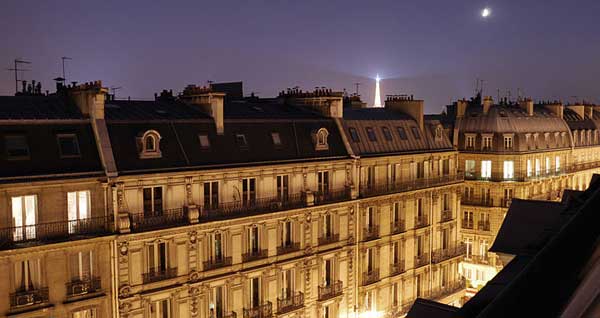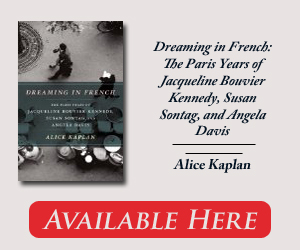
Dreaming In French: The Paris Years of Jacqueline Bouvier Kennedy, Susan Sontag, and Angela Davis, By Alice Kaplan, University of Chicago Press, 289 pp., $26
“If you are lucky enough to have lived in Paris as a young man,” Ernest Hemingway wrote, “then wherever you go for the rest of your life, it stays with you.” Alice Kaplan’s Dreaming in French is a meditation upon that notion, with a twist: her subject is not the parade of young American men who famously passed through Paris in the mid-20th century, but three women whose Paris years were less storied but equally formative: Jacqueline Bouvier, Susan Sontag, and Angela Davis. At first, the premise feels arbitrary—why these three, whose brief, erratically documented French sojourns were soon eclipsed by far more momentous events? And yet Paris was where these strikingly different women explored who they wanted to be, in ways that weren’t conceivable in America. Kaplan’s account of their experiences is at times disjointed and unsatisfying, but from it emerges an understanding of the possibilities and constraints that confronted American women at midcentury.
Bouvier had the most traditional Paris experience—she arrived in 1949 on a junior year abroad from Vassar, already an elegant young lady who spoke impeccable French. She immersed herself in classes at the Sorbonne and group outings to the theater and returned home more accomplished than ever, if not fundamentally altered: Paris simply refined her refinements. And yet for years to come, her exquisite mastery of all things French was viewed mainly as an embellishment to her husband’s career. Kaplan describes a moment in which the First Lady deftly parries a tough question in French from an interviewer without saying anything of substance—an achievement only in the narrowest imaginable sense.
One episode offers a tantalizing glimpse of who Bouvier might have become had she not married Jack Kennedy. In 1951, she sought Vogue’s Paris Prize—a coveted chance to work for six months in the magazine’s French offices. Bouvier charmed the selection committee with her sophistication, but when she was offered the job, she turned it down.(She was contemplating a job with the CIA.) She found her way into publishing decades later, as an editor for Doubleday, and displayed such a gift for the work that one can’t help wonder how her life might have unfolded had she followed her instincts as a young woman.
For Sontag, Paris was where she reinvented herself through force of will. She fled to France in 1957, leaving behind an ill-fated marriage and a five-year-old son. She reconnected with a former lover, Harriet Sohmers, and embarked upon an intellectual’s existence—living in rundown hotels and frequenting literary cafés. At first she spoke hardly any French and socialized with other Americans. But though she was in Paris at the same time as William Burroughs and Allen Ginsberg, she occupied a parallel world—the Beats had little interest in women as equals, only as adoring hangers-on.
Eventually, Sontag taught herself French according to her own idiosyncratic system, assembling lists of words and grammar corresponding to her experiences and ambitions: lexicons of sex, love, slang, names of publishers and critics, and what she called “intellectual conduct”—terms of argument and discourse. Learning French was her means of learning the persona she intended to inhabit. When she returned to America a year later, it was with full ownership of her identity as a lesbian, a writer, and a formidable thinker.
The most intriguing part of Dreaming in French concerns Davis, who grew up in a part of Birmingham, Alabama, known as Dynamite Hill because segregationists planted so many bombs there. She wrote that in childhood, she “constructed a fantasy in which I would slip on a white face” to go to forbidden parts of town. In many ways, French became that mask. She devoted herself to the language in high school and once visited a store with her sister posing as tourists from French-speaking Martinique. The white salesman—who would normally have sent them to the black clerk in the back—fawned over the pair, until Davis taunted him for his hypocrisy.
At Brandeis University, Davis was a shy, disciplined student who read Sartre and Proust. In 1963, she traveled to Paris for her junior year abroad, and gained a reputation as the most talented member of her class. But whereas France opened up intellectual possibilities for Sontag and, to a lesser extent, Bouvier, for Davis it offered something far greater: the chance to be a full citizen in a way that was unthinkable in her native South.
 Of the three women, only Davis developed a mass following in France. It emerged during the height of her fame, in 1970, when as a young professor and prominent Communist, she was charged with complicity in the murder of a judge. Davis went into hiding but was finally arrested after a nationwide dragnet. During her trial—she was ultimately acquitted—the French Left sprang to her defense. Four hundred intellectuals sent letters and petitions seeking her release, including Jacques Derrida, Roland Barthes, and Michel Foucault. Some 60,000 protesters marched in Paris in solidarity, and she received thousands of letters from French people—who, Kaplan suggests, saw her as part of the “long history of female icons who represent revolt and revolution.” The contrast with her image in America as a dangerous radical could not have been starker.
Of the three women, only Davis developed a mass following in France. It emerged during the height of her fame, in 1970, when as a young professor and prominent Communist, she was charged with complicity in the murder of a judge. Davis went into hiding but was finally arrested after a nationwide dragnet. During her trial—she was ultimately acquitted—the French Left sprang to her defense. Four hundred intellectuals sent letters and petitions seeking her release, including Jacques Derrida, Roland Barthes, and Michel Foucault. Some 60,000 protesters marched in Paris in solidarity, and she received thousands of letters from French people—who, Kaplan suggests, saw her as part of the “long history of female icons who represent revolt and revolution.” The contrast with her image in America as a dangerous radical could not have been starker.
The backdrop of this book is not one Paris but several. The city changed between Bouvier’s visit and Davis’s, of course, but the three women came to it in search of different things. For Bouvier, Paris was somewhere to fulfill expectations; for Sontag and Davis, it was a place to discard them. And once they had lived there, they could never look at America the same way again. “Everything is renewed when you speak in a foreign language,” Sontag once told an interviewer in France. “I understood my own country living here.”

